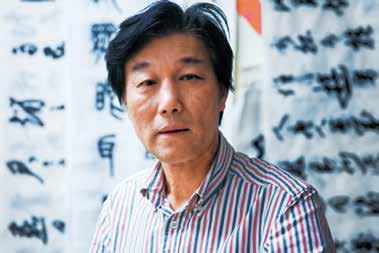Artist Promotes CalligraphicCharms of Hangzhou
2019-03-18LiuYiding
Liu Yiding

宋濤近照。A recent photo of Song Tao
Song Tao, born in 1955, is an accomplished calligrapher based in Hangzhou, capital of eastern Chinas Zhejiang Province. Many of his calligraphy works can be seen across the city. The most prominent calligraphy he has written for the city is probably a 30-square-meter calligraphy work done for East Hangzhou Railway Station toward the end of a refurbishment project in the spring of 2013. Commissioned by the city government, Song went through ancient poems and essays before deciding upon a long poem about the prosperity and natural beauty of Hangzhou by Liu Yong, a celebrated poet of the Song Dynasty (960-1279). After finding the first writing short of calligraphy charms, he invited some celebrated calligraphers over to comment on his second copy. After absorbing their comments and advices, he created the third copy, which pleased him. It is the third copy of the poem that graces a wall at the Eastern Railway Station in Hangzhou.
Song grew up with a penchant for traditional Chinese calligraphy. He was assigned to work at a state farm after his graduation from middle school. He began to practice calligraphy day in day out. It was toward the late 1970s that he ran into Guo Zhongxuan (1919-2008), a prominent calligrapher based in Hangzhou. The master took Song under his wing and later recommended the youngster to Sha Menghai (1900-1992), the best calligrapher in Zhejiang. Under the guidance of the two mentors, Song practiced hard. In the 1990s, he took a systematic study course at China Academy of Art, which was a turning point in his calligrapher career.
Songs calligraphy is characterized by both tradition and innovation. He has integrated tradition and introduced his own characteristics in his handwriting, featuring his profound understanding of the calligraphy from both ancient steles and ancient master copybooks.
His calligraphy has won appraises from various artists such as Wang Dongling, Jiang Beigeng, Zhu Guantian, Jin Jiancai, Chen Zhenlian, all heavyweight calligraphers of national renown.
Song Tao is now a senior director of Xiling Seal Art Society, president of Hangzhou Academy of Calligraphy, and executive vice president of Hangzhou Calligraphers Association, recognition of his achievement and dedication. He has been promoting calligraphy for a long while. In 2011, Hangzhou was designated as a city of calligraphy. In 2013, he proposed to push calligraphy in rural suburbs of Hangzhou, aiming to find and cultivate more calligraphy talents and enthusiasts in rural Hangzhou. Shangtian, a village in Linan, a county-level city in the western suburb of Hangzhou, was named Calligraphy Village, the first of its kind in China. Shangtian is where there are many calligraphers and calligraphy has been a tradition in the local community. Hangzhou Calligraphers Association provides guidance and exchange programs and helps village calligraphers hold events and activities so that they can be better calligraphers. The provincial and local governments like the idea. So far, over 100 rural and urban communities are officially recognized as calligraphy community or calligraphy village, greatly enhancing culture across the province.
Over years, Song has exhibited his works and conducted lectures overseas. He exhibited his works in the United States, Brazil, Argentina, France, Swiss, Poland, Russia, Austria, Singapore and Republic of Korea. He has also given lectures and exhibited his calligraphy in both Taiwan, Hong Kong, Macao. In 2013, he won a gold medal at an international art and calligraphy event in Republic of Korea.
Song is also a fruitful theorist of Chinese calligraphy. He has authored some theory books on both calligraphy and the history of calligraphy in Hangzhou. he has presided at seminars on calligraphy in regions across Zhejiang. He wrote Calligraphy of the West Lake and A History of Calligraphy in Hangzhou. The two books provide a new perspective on the history and achievement of calligraphy and calligraphers in Hangzhou. Moreover, as an editor-in-chief, Song has also published over 60 books about culture and history of Hangzhou.
Now in retirement, Song teaches calligraphy and works as an advisor concerning calligraphy and related activities.
